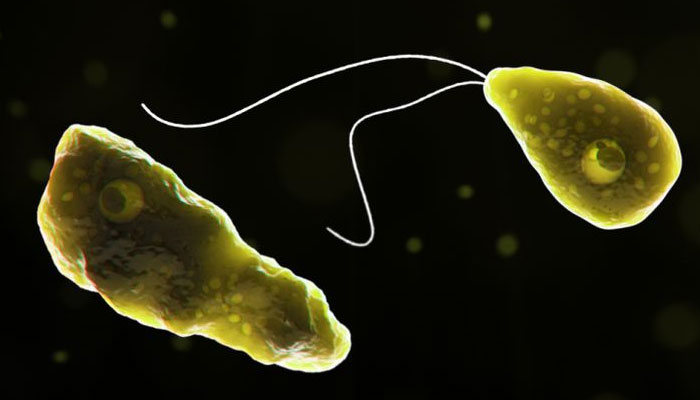Year’s death toll rises to 14 as brain-eating amoeba claims second life in two days
Owing to poor environmental and unhygienic conditions in Karachi, the city is in the grip of all kinds of deadly viral, bacterial and other infectious diseases, as one more person died due to the brain-eating Naegleria fowleri bug, bringing the year’s death toll to 14, officials said on Saturday.
“Akbar Asad, 26, a resident of Gulistan-e-Jauhar Block-27 was taken to the Aga Khan University Hospital [AKUH] on Thursday after complaining of fever, vomiting and headache,” an official of the Sindh Health Department told The News.
“The analysis of his cerebrospinal fluid revealed that he was infected with Naegleria fowleri. The patient died during treatment on Friday afternoon,” said the official.
This is the second death due to primary amoebic meningoencephalitis (PAM) caused by Naegleria fowleri in two days in the city, as 19-year-old Jamshed Hamid, a resident of Yousuf Goth in Malir, had passed away late on Thursday night.
Experts say the disease caused by Naegleria fowleri is a rare and usually fatal brain infection, and exposure to this microorganism occurs during swimming or other water sports, as this protozoan is found in freshwater lakes, rivers and hot springs. The amoeba travels up the nose to the brain, where it causes severe damage. The health department officials said Asad was the 14th case of Naegleria fowleri infection in Karachi this year, adding that last month a 16-year-old boy from Mehmoodabad had died due to PAM, a rare disease caused by the brain-eating bug.
“The [latest] patient Akbar Asad developed persistent vomiting starting early morning on Thursday, following which he visited the AKUH and took symptomatic medicine and returned home around 4pm,” said an official. “Due to no improvement in his signs and symptoms, he visited another physician, who treated him as a patient of gastroenteritis.”
The official said that at around 2am on Thursday, the patient fell unconscious so his family immediately took him to the AKUH, where he was kept in the ICU. He passed away during the night on Friday, added the official.
Urgent need
A day earlier, Sindh Health Director General Dr Masood Solangi had said their teams of experts had started investigating Hamid’s case and also visited the residence of the deceased to interview his family.
He said that the family had informed them that the young man had gone swimming at a local pool, adding that the swimming pool lacking chlorination could be the place where he contracted the deadly brain infection.
“For the past many months and years, our teams of experts are recommending that there is an urgent need to assess the process of chlorination and the level of chlorine in water at all the major water reservoirs supplying water as per the recommendations of the World Health Organisation.”
Dr Solangi said that cleanliness must be maintained at all reservoirs, overhead tanks and other reservoirs of household, pumping stations and hydrants at regular intervals. He said water lines must be checked for leakages and rectified at the earliest to avoid contamination with sewage, stressing an urgent need to sensitise the people to treat their tanks with bleaching powder on a regular basis.
Capacity building of local health care workers in terms of surveillance, early identification and case management is also required, he added. “We are planning to involve the print and electronic media for public awareness on a regular basis.”
-
 Is Elon Musk Set To Become First Trillionaire In 2026? Market Odds Explained
Is Elon Musk Set To Become First Trillionaire In 2026? Market Odds Explained -
 Prince Harry’s Protective Stance On Meghan Markle Sparked Rift With William, Charles
Prince Harry’s Protective Stance On Meghan Markle Sparked Rift With William, Charles -
 How BTS Push Through Performances As They Gear For 2026 Comeback
How BTS Push Through Performances As They Gear For 2026 Comeback -
 AI Copyright Battle: ByteDance To Curb Seedance 2.0 Amid Disney Lawsuit Warning
AI Copyright Battle: ByteDance To Curb Seedance 2.0 Amid Disney Lawsuit Warning -
 Savannah Guthrie In Tears As She Makes Desperate Plea To Mom's Kidnappers
Savannah Guthrie In Tears As She Makes Desperate Plea To Mom's Kidnappers -
 Canada’s Defence Industrial Strategy Targets 125,000 Jobs And Export Growth
Canada’s Defence Industrial Strategy Targets 125,000 Jobs And Export Growth -
 Tre Johnson, Former NFL Guard And Teacher, Passes Away At 54
Tre Johnson, Former NFL Guard And Teacher, Passes Away At 54 -
 Jerome Tang Calls Out Team After Embarrassing Home Defeat
Jerome Tang Calls Out Team After Embarrassing Home Defeat -
 Cynthia Erivo Addresses Bizarre Rumour About Her Relationship With Ariana Grande
Cynthia Erivo Addresses Bizarre Rumour About Her Relationship With Ariana Grande -
 Prince Harry, Meghan Markle Spotted Cosying Up At NBA All-Star Game
Prince Harry, Meghan Markle Spotted Cosying Up At NBA All-Star Game -
 Lady Gaga Explains How Fibromyalgia Lets Her 'connect With People Who Have It'
Lady Gaga Explains How Fibromyalgia Lets Her 'connect With People Who Have It' -
 Metro Detroit Weather Forecast: Is The Polar Vortex Coming Back?
Metro Detroit Weather Forecast: Is The Polar Vortex Coming Back? -
 Daniel Radcliffe Reveals Surprising Way Fatherhood Changed Him
Daniel Radcliffe Reveals Surprising Way Fatherhood Changed Him -
 ‘Disgraced’ Andrew At Risk Of Breaking Point As Epstein Scandal Continues
‘Disgraced’ Andrew At Risk Of Breaking Point As Epstein Scandal Continues -
 Alan Cumming Shares Plans With 2026 Bafta Film Awards
Alan Cumming Shares Plans With 2026 Bafta Film Awards -
 OpenClaw Founder Peter Steinberger Hired By OpenAI As AI Agent Race Heats Up
OpenClaw Founder Peter Steinberger Hired By OpenAI As AI Agent Race Heats Up




